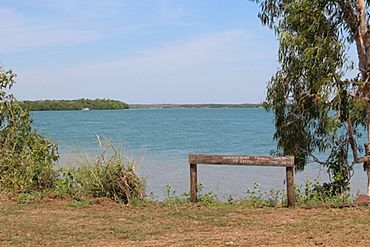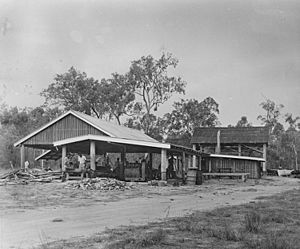Aurukun, Queensland facts for kids
Quick facts for kids AurukunQueensland |
|
|---|---|

2014
|
|
| Population | 1,269 (2016 census) |
| • Density | 0.17116/km2 (0.4433/sq mi) |
| Postcode(s) | 4892 |
| Area | 7,413.9 km2 (2,862.5 sq mi) |
| Location | |
| LGA(s) |
|
| County | Kendell County, Queensland |
| State electorate(s) | Cook |
| Federal Division(s) | Leichhardt |
Aurukun is a town and coastal locality in the Shire of Aurukun and the Shire of Cook in Far North Queensland, Australia. It is an Indigenous community.
Contents
Demographics
At the 2016 census, Aurukun had a population of 1,269, including 1,147 Aboriginal and Torres Strait Islander people, up from a total population of 1,043 in 2006. 95.8% of people were born in Australia. 10.6% of people only spoke English at home. Other languages spoken at home included Cape York Peninsula languages 61.6% and Wik Mungkan 14.7%. The most common responses for religion were Uniting Church 44.3%, No Religion 29.3% and Presbyterian and Reformed 11.0%.
Aurukun is home to a plethora of Aboriginal groups. As of 2013[update] there were some 50 to 60 families from five major clan groups.
History
The first recorded contact between Europeans and Aboriginals was near Aurukun on the Janszoon voyage of 1605–06.
The Aurukun Mission (known then as the Archer River Mission Station) was established on 4 August 1904 for the Presbyterian Church of Australia by the Reverend Arthur and Mrs Mary Richter, two Moravian missionaries and managed under the provisions of the Queensland Aborigines Act. (Several of the current residents were taught by these missionaries and remember them well.) Aboriginal people were relocated from a large surrounding area, many against their will, to the mission settlement. Aurukun was "ruled" for 40 years by Reverend William Mackenzie - as the missions Chief Protector for the Aboriginal Protection Board. The town also had a sawmill, butcher and bakery. Today there is only a general store.
Aurukun Post Office opened on 1 July 1972. In 1978, the Queensland government decided to take over control of both the Aurukun and Mornington Island Reserves. Both communities were against this and protested seeking the help of the Federal government.
After lengthy negotiations, legislation for self-management of the two reserves was introduced into federal parliament and the Aboriginal and Torres Strait Islanders (Queensland Reserves and Communities Self Management) Act was passed on 7 April 1978.
Further negotiations took place between State and Federal Ministers and on 22 May 1978, the Local Government (Aboriginal Lands) Act came into force giving a 50-year lease to the Shire of Aurukun to be trustee for the land within the boundaries. Aurukun and Mornington Shire remain the only Aboriginal communities in Queensland constituted as local authorities.
With the coming of the missionaries, children were confined to dormitories to isolate them from the influence of their people. However, many people remained outside the mission up until the 1950s, ensuring the culture remained strong.
In 1975, the community was placed under direct State government control. In 1978, the Aurukun people were given a 50-year lease on their land under the administration of the shire clerk and an elected Aboriginal Council.
Following the Wik case the land has reverted to Native Title held by the Wik people. The focal area of the Wik lies between the Archer and Edward Rivers of Western Cape York Peninsula and inland to Coen. Most Wik people still live in this triangle.
Arts and recreation
The Wik and Kugu Art Centre in Aukurun opened in 1987, making it the oldest established art centre on Cape York Peninsula. The Centre has about 30 members, and artists from the Centre participate in competitions and exhibitions worldwide. Aurukun artists are famous for their sculptures, which traditionally were carved from soft woods for use in ceremony.
Aurukun is home to a community swimming pool, and a new large basketball hall / recreational centre. There are outdoor basketball courts and a rugby field. Aurukun participates in football carnivals and softball with other communities in the Cape region every couple of months.
Bushwalking, fishing and some camping are the dominant pursuits for tourists visiting. Visitors are required to apply for a permit from the Aurukun Shire Council prior to entering the community.
Possum Creek is a swimming hole 30 kilometres (19 mi) West of the town. Sandy Creek is a swimming hole 40 kilometres (25 mi) from Possum Creek. Emu Creek is a 4wd track 37 kilometres (23 mi) to the old road turn off and then 80 kilometres (50 mi) of Bush track. Aurukun landing is 1.5 kilometres (0.93 mi) from town and provides access to Archer River (crocodiles present) Umban is a 4wd camping ground just under 2 hrs drive.
Education
Aurukun has a primary school which is operated by Cape York Aboriginal Australian Academy (CYAAA) in a unique partnership with Education Queensland. The school opened on 29 January 1974 and caters for students from pre-prep to year 7. The school remains the only school in Aurukun. Classroom instruction is dedicated to teaching mainstream curriculum in English literacy and numeracy using Direct Instruction. The Direct Instruction method focuses on individual student outcomes, repetition and weekly tests with the aim to ensure students are mastering literacy and numeracy basics. Students are also taught a comprehensive Indigenous culture and language program which aims to give children fluency in their own cultures and enjoy the best of both worlds. The school provides an extended school day which involves artistic, musical and sports programs (in partnership with national bodies) which aims to give children increased confidence and socially prepare them for moving between homelands, work and study in the wider world.
In 2008, one in three children were not enrolled for primary school. Following welfare reform trials introduced in July 2008, school attendance had risen from an average of 37 per cent to 63 per cent in September 2009.
Following incidents where teachers and the principal were threatened, rocks were thrown at their housing, and children as young as six tried to steal a car, all teachers were evacuated from the school in May 2016. As a result, the school was closed for six weeks with only distance education programs being continued. The incidents have drawn the effectiveness of the Direct Instruction method into question, and as of July 2016 the Queensland Government is implementing an Australian curriculum into the school alongside Direct Instruction.



